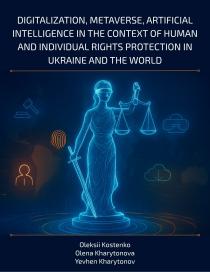ARTIFICIAL INTELLIGENCE AND OTHER DIGITAL TECHNOLOGIES IN THE CORPORATE SECTOR
Synopsis
This chapter is dedicated to the study of the regulating framework and legal consequences of using artificial intelligence or AI and other, digital technologies in the sphere of corporations in the hearts of the common law jurisdictions and me. The author addresses the issue of the evolution of digitalization in corporate law – from using digital technologies for merely replacing paper with documents to creating fully online procedures. Some examples could be the EU ‘Digital Single Market Strategy’ and European Commission’s ‘e-Governance Action Plan 2016-2020’ as well as some national programs, e.g.: Ukraine to develop the digital economy and implement the ‘Digital by Default’ principle. This section also focuses on the way AI systems and blockchain can modify a company’s governance structure by making it more transparent, automatizing decision-making, and creating new types of companies. Relying on the formulated conclusions regarding the legislative and case-law analysis, the author also suggests a conceptual model to harmonize national regulation in corporate matters with new, digital paradigms.










